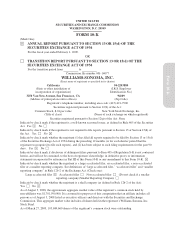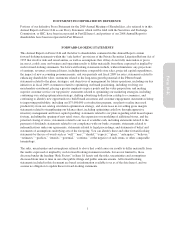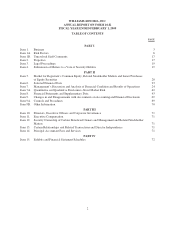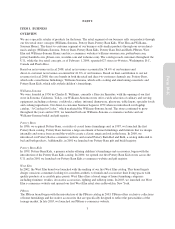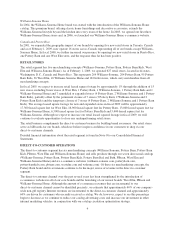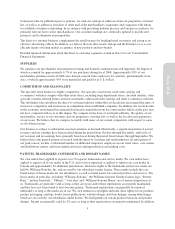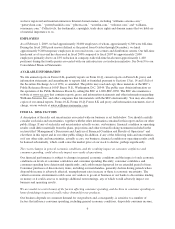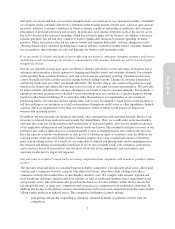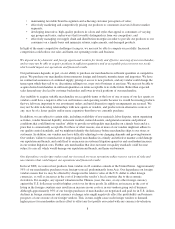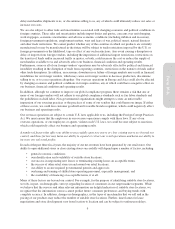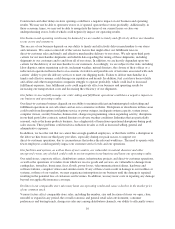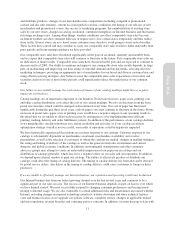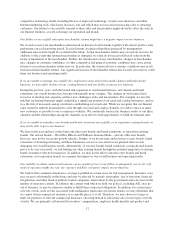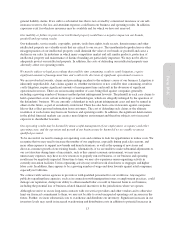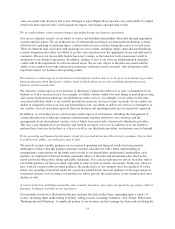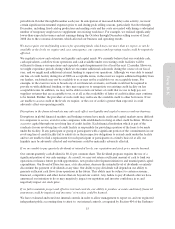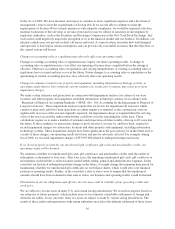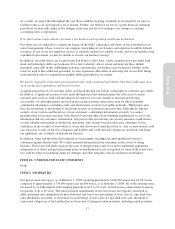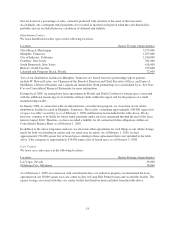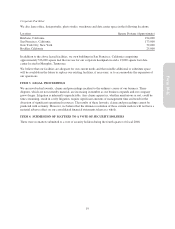Pottery Barn 2008 Annual Report Download - page 21
Download and view the complete annual report
Please find page 21 of the 2008 Pottery Barn annual report below. You can navigate through the pages in the report by either clicking on the pages listed below, or by using the keyword search tool below to find specific information within the annual report.
delay merchandise shipments to us, or discontinue selling to us, any of which could ultimately reduce our sales or
increase our costs.
We are also subject to other risks and uncertainties associated with changing economic and political conditions in
foreign countries. These risks and uncertainties include import duties and quotas, concerns over anti-dumping,
work stoppages, economic uncertainties and adverse economic conditions (including inflation and recession),
foreign government regulations, employment matters, wars and fears of war, political unrest, natural disasters
and other trade restrictions. We cannot predict whether any of the countries in which our products are currently
manufactured or may be manufactured in the future will be subject to trade restrictions imposed by the U.S. or
foreign governments or the likelihood, type or effect of any such restrictions. Any event causing a disruption or
delay of imports from foreign vendors, including the imposition of additional import restrictions, restrictions on
the transfer of funds and/or increased tariffs or quotas, or both, could increase the cost or reduce the supply of
merchandise available to us and adversely affect our business, financial condition and operating results.
Furthermore, some or all of our foreign vendors’ operations may be adversely affected by political and financial
instability resulting in the disruption of trade from exporting countries, restrictions on the transfer of funds and/or
other trade disruptions. In addition, an economic downturn in or failure of foreign markets may result in financial
instabilities for our foreign vendors, which may cause our foreign vendors to decrease production, discontinue
selling to us, or to cease operations altogether. Our overseas operations in Europe and Asia could also be affected
by changing economic and political conditions in foreign countries, any of which could have a negative effect on
our business, financial condition and operating results.
In addition, although we continue to improve our global compliance program, there remains a risk that one or
more of our foreign vendors will not adhere to our global compliance standards such as fair labor standards and
the prohibition on child labor. Non-governmental organizations might attempt to create an unfavorable
impression of our sourcing practices or the practices of some of our vendors that could harm our image. If either
of these occurs, we could lose customer goodwill and favorable brand recognition, which could negatively affect
our business and operating results.
Our overseas operations are subject to certain U.S. laws applicable to us, including the Foreign Corrupt Practices
Act. We must ensure that the employees in our overseas operations comply with these laws. If any of our
overseas operations, or our employees or agents, violates such U.S. laws, we could become subject to sanctions,
which could negatively affect our business and operating results.
A number of factors that affect our ability to successfully open new stores or close existing stores are beyond our
control, and these factors may harm our ability to expand or retract our retail operations and harm our ability to
increase our sales and profits.
In each of the past three fiscal years, the majority of our net revenues have been generated by our retail stores. Our
ability to open additional stores or close existing stores successfully will depend upon a number of factors, including:
• general economic conditions;
• our identification and availability of suitable store locations;
• our success in negotiating new leases or terminating existing leases on acceptable terms;
• the success of other retail stores in and around our retail locations;
• our ability to secure required governmental permits and approvals;
• our hiring and training of skilled store operating personnel, especially management; and
• the availability of financing on acceptable terms, if at all.
Many of these factors are beyond our control. For example, for the purpose of identifying suitable store locations,
we rely, in part, on demographic surveys regarding location of consumers in our target market segments. While
we believe that the surveys and other relevant information are helpful indicators of suitable store locations, we
recognize that the information sources cannot predict future consumer preferences and buying trends with
complete accuracy. In addition, changes in demographics, in the types of merchandise that we sell and in the
pricing of our products may reduce the number of suitable store locations. Further, time frames for lease
negotiations and store development vary from location to location and can be subject to unforeseen delays.
9
Form 10-K


